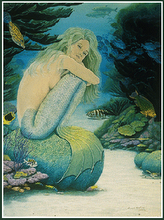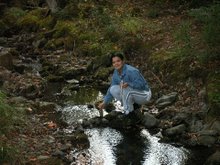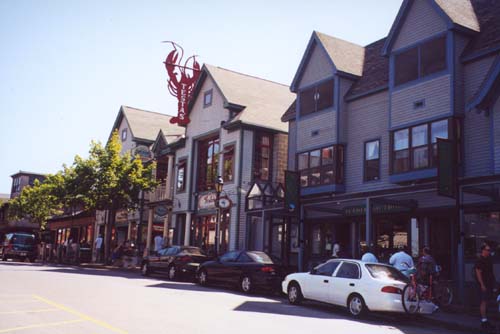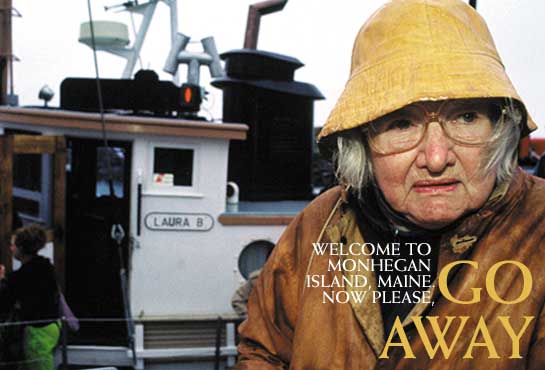Joe Hill, An interview on Febuary 11th, 2008.
Febuary 11th, 2008.

Joe Hill is one of those rare creatures—a writer who broke through onto the literary scene with short stories and established his career from there. He has since achieved a huge amount of recognition and won various awards for both his longer and shorter works.
Here, he talks a little about his love of comic books and of how he found himself writing short stories.
+Hillstrom+King.jpg) L.A. - You’re often described as a horror writer, but much of your work is fantasy or mixed genre. How would you classify yourself in terms of genre?
L.A. - You’re often described as a horror writer, but much of your work is fantasy or mixed genre. How would you classify yourself in terms of genre?
J.H. - When I was a kid I used to read Fangoria Magazine and the thing that used to make me nuts was when I’d read some interview with a director who had just directed Hollywood Meatloaf Massacre IV and he would insist that he didn’t make horror films. I’d be thinking to myself “Jesus, guy, did you actually watch the picture that you directed? Of course it’s a horror film!” I would be very comfortable saying that Heart-Shaped Box is a horror novel and there are stories of horror in 20th Century Ghosts; I love horror fiction. I don’t feel confined to horror fiction, though, and if I’m working on a story that has the right values, hopefully that will find an audience regardless of the specific genre it belongs to. So I don’t know if I think of myself as a horror writer per se, but I have certainly enjoyed writing horror stories from time to time.
L.A. -In another interview you said that your short story “Best New Horror” was written as a defence of surreal dark fantasy. Is that something that is important to you; do you feel that it needs to be defended?
J.H. -I think that in some ways maybe it needs to be defended less now that it did even a few years ago, but yeah, I think that to a certain segment of the book reading audience, horror fiction is third class literature at best; it’s the red light district of the literary world, that doesn’t deserve the same consideration we would give mainstream literature, or even a certain type of highbrow fantasy written by, say, Italo Calvino, but I think there is a long important literary tradition of horror fiction going back to M.R. James and Shirley Jackson, and Dickens wrote ghost stories. So, yeah, I think it’s important to stick up for the genre every once in a while, remind people that the genre can have some literary weight and that horror fiction doesn’t necessarily have to be disposable, that it can engage in the way that other forms of literature do
L.A. -When we talk about “Horror,” the term carries a lot of different connotations for different people. What does it mean to you?
J.H. - I think that all fiction lives or dies based on suspense. If you don’t care about what happens next, there’s no reason to read on, and the defining characteristic of horror fiction is that it takes suspense to its most extreme limit. A piece that pushes the reader’s buttons to the point of thinking “Oh my God, I can barely bear to go on, because this is getting so terrible, and yet I can’t put it down because I want to see how it turns out.” So to an extent, I think that any story that has that suspense and tension has the possibility of becoming a horror story, and any story that doesn’t have that suspense isn’t worth finishing.
L.A. - You made your name and founded your career on short fiction before moving on to longer work. What is it about short stories that excite you?
J.H. -I love short stories. I much prefer short stories to the novel. As a kid, I think the first stories that I really woke up to were comic books. The first stories I really felt passionate about were short stories, not novels; they were the Sherlock Holmes stories. When I was eleven or twelve, they were the stories that set my imagination on fire. Ray Bradbury, too—I really fell into Ray Bradbury stories as a kid.
Part of the reason I wound up writing so many short stories and caring so much about them as a form was because I was really a failed novelist. I had done such a bad job at it. Before "Heart Shaped Box", I wrote four novels that I was never able to sell, including one that I’ve talked about here and there—"The Fear Tree". It was almost a thousand pages long, and I thought it was a really good book. I still think it has some really good qualities, but I couldn’t sell it in America, I couldn’t sell it in Canada, I couldn’t sell it in England. I tried big presses, I tried small presses, but no-one would have it, and it was a real life changing experience to have invested so much time and energy into a piece of work that never found a market, and that was never read by more than about half a dozen people. After that, I thought, I’m never going to put so much of myself into a single work again. I wasn’t willing to spend three years writing something a thousand pages long. I also realised that part of the reason the book failed to sell was that it did have inherent flaws, that it sprawled too much; reeling away from this wreck of a book, I realised, I’ve got to get smaller, and so, I started writing short stories.
There is an illusion—which isn’t true—that in a thirty-page short story you can be perfect, that every sentence can add something to the story and have meaning. It’s not true, you’ll never have a perfect story, but still, it seems possible that at the twenty- or thirty-page level you could have the perfect story, whereas with a novel, you’re bound to take some wrong turns, and there is bound to be some material that works less well than the rest.
L.A. -As someone who has written both shorter and longer works with a great deal of success, would you agree with claims that short fiction writers find it harder to gain recognition in the literary world than novelists?
J.H. -That’s a tough one to answer. Clearly you can’t survive commercially as a writer on just short stories. That era has been gone for maybe three decades. I doubt if even thirty years ago there was much of a living to be made just off short fiction, but there were writers like Raymond Carver and Tobias Wolf who made a certain number of sales to The New Yorker and other high profile markets, and back then, there was some money in it. I don’t think that that time is still with us, and yet, I think that for a writer, creatively and artistically, you really learn your craft in the crucible of the short story. I don’t know how writers will learn what they have to learn if there are no more markets for short fiction. I think that one thing you see in a lot of writers of my generation is a lack of economy, and a lack of focus. This is the natural result of two things—so many writers are writing fewer short stories because there are fewer places to sell them and therefore there is less motivation to write them, so writers don’t learn how to tell that story in twenty pages, and the other problem is that the word processing technology encourages sprawl. It invites you to write a page when a sentence would do. So my hope is that writers do continue to write short stories, and there continues to be a market for them, because it is an important part of the process.
I do think we see writers like Kelly Link, who begin with short stories and do gain a level of recognition for their craft. So there are still some people who break out with short fiction.
L.A. - “Pop Art,” one of your best known short stories, is to be made into an indie film in the UK. How do you view the prospect of seeing your characters come to life through someone else’s interpretation of your work?
J.H. - It’s being made by a talented young film maker called Amanda Boyle. I read several drafts of the script that she showed me, and I thought they were all good, and I thought the draft that she decided to film was especially strong. It will be interesting to see what she comes up with. I told my version of the story. My version of the story is the version that appears in "20th Century Ghosts", so on one level, whatever Amanda winds up doing is completely divorced from what I did. She has to tell her version of the story. It will be interesting to see how it comes out.
L.A. - During my research, there was mention of a partially completed story called “But Only Darkness Loves Me” which, it says, you collaborated on with your father. Is a collaborative project with a view to publication something you would be interested in working on at some point in the future?
J.H. - It’s funny, someone mentioned this a few months ago, and I have no memory of this story. All I can think is that it must have been something we worked on when I was a kid. As kids, we would spend time as a family, passing a story around, writing a page each at a time, so that it became this sort of improvisational game where you see what you get in ten pages, and my dad would take a turn, and I would take a turn, and my brother would take a turn, my mum would take a turn, and my sister would take a turn, and two times through and you would have a complete story. We did that a few times, and all I can think is that maybe this “Darkness Loves Me” was one of those stories, in which case I suspect that we all would have messed around with it.
If I was going to collaborate, and I’m not sure that collaboration is definitely a good idea, I’d probably want to collaborate with someone in my family—either my dad, or my mum or my brother. In fact I have actually written two screenplays with my brother, Owen King. It was sort of my former career. I have a secret history of screenwriting. It precedes the publication of "20th Century Ghosts" and "Heart Shaped Box", and was something I did in the late ’90s.
L.A. - Do you find it challenging to move between the different forms of writing?
J.H. - This is something I learned from Neil Gaiman, who is someone I have read since I was in high school, and someone who has meant a lot to me. I think he defines the best of what is possible for a 21st Century writer, in the sense that he manages to maintain his literary identity across a variety of forms. He writes shorts stories and poetry; he writes novels and comics. He writes screenplays, and it looks like with Beowulf has finally landed his first hit as a screenwriter. He’s the jack of all literary trades. I think that you can see a lot of other writers who have gradually shifted in that direction, who are able to work in a variety of different forms, and that’s something I’ve always aspired to. I’ve always wanted to be able to move across different forms.
One thing I wanted intensely for years, which was sort of my ultimate long-term writing goal, was to write for comics. I think that as a storytelling form, comic books are just about the most exciting form out there. I’m sort of half joking when I say it, but the frustrating thing about movies is that they’re not collaborative, all you do is sit there on your ass and watch them. Books are very collaborative, they invite the reader to do half the work, but the problem with books is, they’re so full of words. What I like about comics is that they invite the reader in to collaborate just like a book, but they move with the acceleration of a film, and that makes them extremely fun to play in. My first professional fiction submission was to Marvel Comics. They turned me down. I was twelve.
I’ve always loved comics, and a lot of my favourite writers have worked in comics. Alan Moore, Neil Gaiman, Frank Miller, and more recently Brian K Vaughan… there is just this incredibly gifted set of writers who work almost exclusively in comic books. One thing that has been really exciting for me is that over the last couple of years, I have had a chance to scratch that itch and do some work in comics.
L.A. - What advice would you pass on to other writers who are just starting out?
J.H. - I’ve got to think of something fresh to say to that question. The advice writers tend to give is so routinely the same; they always say “write every day,” so young writers hear that a lot. They may not do it, but they hear it.
I would say this: don’t kid yourself about what you love. That’s the first step to having some success as a writer, and I’m not talking about commercial success; I’m just talking about artistic success. If there’s a certain type of fiction you find yourself reading obsessively, that’s a big hint that it’s an area you could work in. The other thing I would say is develop a circle of three or four readers who will give it to you straight. If they are saying “it was great” every time you give them a story, you’ve got the wrong readers. You don’t want a reader who is going to say “it was great.” You’ve got to step back from your own work, pretend that it’s the work of someone else, and find some readers who will say “I loved the first page, everything after that stunk…” You need people who will give it to you with painful honesty, because that’s the only way you get better.
L.A. - So now Joe, what comes next for you then?
J.M. - I’ve got a new novel that will hopefully be finished early this year. I have a completed young adult novel, which is also a tale of dark fantasy. In the past I have referred to it as Heart Shaped Box for eleven-year-olds. It’s not, it’s very different, but it has a lot of the same values, just aimed at a much younger audience. The other thing I have going on is I have a comic book coming out called "Locke and Key" which I am doing with IDW, the same publisher who did 30 Days of Night. I think the first issue will be out in February. There are going to be six issues initially, which will tell a story about my main characters, but not the complete story. So we’ll see how that does, and there may be some more Locke and Key stories if people like it.
L.A. - Well, I thank you for your time and I most certainly appreciate your work and friendship, and I look forward to more of your new works!
















